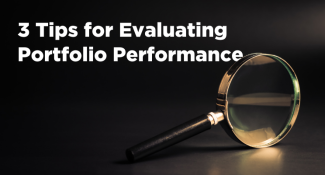
3 Tips for Evaluating Portfolio Performance
Building a portfolio is a big effort. It requires considering your goals, time horizon, and risk tolerance. Once that’s settled, you’ll have to choose investments that match these criteria. And this is only the beginning. Portfolios require regular monitoring and performance evaluation to ensure that the assets you own are still working together to help you reach your financial goals.
There are several ways to determine how well your investments are doing. Here are three things to bear in mind for putting gains and losses in your portfolio into a relevant context:
- Your goals
When you built your portfolio, you likely started with your financial goals and determined the average annual return you need to meet them. With that information in mind, review your investment performance to see whether you’re on track to meet those goals.
Remember that investing is a long-term proposition. If you’ve only been investing for a few years, short-term market swings will have a greater effect on your portfolio and may not reflect the annual return of a long-term plan. If you’ve been investing for several years, you may be able to get a better sense of your portfolio’s longer-term performance.
If your long-term annual returns are not enough to meet your goals, you may need to reconsider your objectives by choosing less expensive alternatives. Or you might reconsider your risk tolerance and allocate more of your portfolio to assets like stocks, which are riskier, but potentially offer higher returns.
- The broader market
One way to gain a relatively broad idea of how your portfolio is doing is by benchmarking it against a broader market index. For example, you could compare your stock portfolio to the S&P 500 for a general sense of how your portfolio is doing compared with the market. If your portfolio is down at the same time there is a market downturn, it’s likely there’s a systemic issue in the market rather than a problem with your portfolio. In some cases, lackluster returns in an up market may lead you to reconsider your portfolio allocation.
That said, remember that your portfolio likely differs from market indices in several ways. For example, if you have a relatively low risk tolerance, you might hold more conservative assets that could cause your portfolio to underperform the market index slightly.
- Risk tolerance
Your personal risk tolerance plays an important part in how you invest — and it’s a critical consideration when evaluating performance.
If you have a low risk tolerance, you’ll likely build a portfolio that smooths over volatility as much as possible. Say your target average annual return is 5%. In a volatile portfolio, you could hit your target with a -20% return one year and a 30% return the next. But that rollercoaster ride may leave your stomach churning. On the other hand, a portfolio that produces a 2% return one year and an 8% return the next might be more palatable.
If you see that your low-risk portfolio underperforms a rising market, it might just be doing its job smoothing out ups and downs. Outperforming a rising market could even be a symptom of a portfolio overly concentrated in one investment type, such as technology stocks.
Regular check-ins
Regularly revisiting your portfolio’s performance is an important part of investing. But for those evaluations to be useful, you must place your recent returns in their proper context. That requires focusing on your own financial goals, your investment preferences, and the larger economic issues at play. Your financial advisor can help you evaluate your portfolio performance using these and other metrics to help ensure that you’re on track to meet your financial goals.
This content is developed from sources believed to be providing accurate information. The information provided is not written or intended as tax or legal advice and may not be relied on for purposes of avoiding any Federal tax penalties. Individuals are encouraged to seek advice from their own tax or legal counsel. Please note, changes in tax law or regulations may occur at any time and could substantially impact your situation. Individuals involved in the estate planning process should work with an estate planning team, including their own personal legal or tax counsel. Neither the information presented nor any opinion expressed constitutes a representation by us of a specific investment or the purchase or sale of any securities. Asset allocation and diversification do not ensure a profit or protect against loss in declining markets. This material was created by The Oeschli Institute to provide information on a topic that may be of interest.

